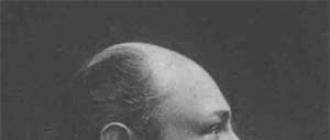The ninth episode of the first part of the novel by Ivan Aleksandrovich Goncharov is the chapter “Oblomov’s Dream”. In it, a young landowner, who has recently turned thirty, falls asleep in his unkempt rented four-room St. Petersburg apartment, and in his dreams scenes from his own childhood appear to him. Nothing fantastic or far-fetched. Agree, it rarely happens in a dream when we see documentary pure form. Of course, this is the author. Oblomov's dream is a kind of journey to the time when Ilya Ilyich was still a child, surrounded by blind parental love.
Why did Goncharov choose such an unusual form of storytelling? The need for her presence in the novel is obvious. A young man in the prime of his life, at an age at which his peers have achieved significant success in life, spends his days lying on the sofa. Moreover, he does not feel any internal need to get up and do something. It was not by chance or suddenly that Oblomov came to such an empty inner world and crippled personality. Oblomov's dream is an analysis of those primary impressions and sensations of the boy Ilyusha, which later developed into beliefs and formed the very basis, the foundation of his personality. Goncharov’s appeal to the childhood of his hero is not accidental. It is childhood impressions, as we know, that bring either a creative or destructive element into a person’s life.
Oblomovka - feudal reserve of laziness

Oblomov's dream begins with his seven-year-old stay in his parents' estate, the village of Oblomovka. This little world is on the outskirts. News does not reach here; there are practically no visitors here with their troubles. Oblomov's parents come from an old noble family. A generation ago, their home was one of the best in the area. Life was in full swing here. However, the blood gradually cooled in the veins of these landowners. There is no need to work, they decided, three hundred and fifty serfs will still bring income. Why bother if life will still be full and comfortable. This ancestral laziness, when the only concern of the entire family before dinner was preparing it, and after it the whole manor's house fell into slumber, like a disease, was passed on to Ilyusha. Surrounded by a host of nannies, rushing to fulfill any wish of the child, not even allowing him to get up from the sofa, alive and active child absorbed an aversion to work and even fun with peers. He gradually became lethargic and apathetic.
A senseless flight on the wings of fantasy
Then Oblomov’s dream transported him to the moment when the nanny was reading fairy tales to him. The child’s creative potential, buried deep within, found an outlet here. However, this way out was unique: from the perception of Pushkin’s fairy-tale images to the further transfer of them into one’s dreams. Oblomov's dream indicates to us the fact that Ilyusha perceived stories differently than other children who, having heard a fairy tale, begin to actively play with their peers. He played differently: having heard a fairy tale, he immersed its heroes in his dream in order to virtually accomplish feats and noble deeds with them. He didn't need peers, didn't need to participate in anything. Gradually, the dream world replaced the boy’s real desires and aspirations. He weakened, any work began to seem boring to him, unworthy of his attention. Work, Oblomov believed, was for the serfs Vanek and Zakharok.
A school that hasn’t changed your life position

Oblomov's dream plunged him into school years, where he and his peer Andryusha Stolz were taught a course by the latter’s father primary school. The studies took place in the neighboring village of Verkhlev. Ilyusha Oblomov at that time was a boy of about fourteen, overweight and passive. It would seem that next to him he saw the Stolts father and son, active, active. This was a chance for Oblomov to change his outlook on life. However, this did not happen, unfortunately. Suppressed by serfdom, one village turned out to be similar to another. Just like in Oblomovka, laziness flourished here. People were in a passive, drowsy state. “The world does not live like the Stolts,” Ilyusha decided and remained in the grip of laziness.
Ilya Ilyich Oblomov - main character novel by I.A. Goncharova is a tragic, contradictory character. His personality is the result of his upbringing in childhood and youth, the influence of the customs of the village of Oblomovka on him. The episode “Oblomov’s Dream” reveals this statement in the best possible way.
This chapter is plot-complete and does not affect the course of the rest of the story. Its function is a deeper disclosure of the image of the main character Oblomov. Here the hero's childhood is presented in detail, from the description of which it becomes clear that laziness was instilled in Ilya by his parents and nannies and is not at all an innate quality.
Oblomov village
The village of Oblomovka is surrounded by laziness and idleness; all its inhabitants are alike. Everything that differed from the usual way of life of the Oblomovites frightened them. The only concern for the inhabitants of the village was obtaining food and arranging conditions for recreation.
At the beginning of the dream, Oblomov appears in the guise of a seven-year-old boy. He is cheerful, playful, everything is interesting to him, everything causes him delight and curiosity, he strives to know the world in all its manifestations. But the overprotectiveness of his mother and nanny hinder him in his endeavors. They don’t allow him to play in the sun so that his head doesn’t get hot; in bad weather they dress him so that he can’t move. In the middle of the day, the whole village began to sleep, when even the nanny fell asleep. In these short moments the child was left to his own devices.
Childhood
Next, Ilya sees himself already thirteen years old. The customs of Oblomovka’s life are already quite firmly entrenched within him. He no longer knows that it is possible to live any differently from his parents. Teaching does not attract him, firstly because for this he has to go to the neighboring estate to the Stolts, and secondly, Ilya does not see the point in it. Any desire expressed by a teenager is immediately fulfilled by two or three servants, and all the mother’s concern comes down to ensuring that her son is cheerful, healthy and fat.
Ilya's servant Zakhar still dresses the boy, reminds him to wash and ties his shoelaces. Oblomov is no longer interested in anything. And if he has a desire to do something himself, his parents shout with one voice - why? So all his aspirations came to naught.
Fairy tale
The intonation of the narrative is reminiscent of a fairy tale, conveying the poetry of an ancient village way of life, a folk tale, a mournful song. In Oblomovka, nature is spiritualized: the sun shines brighter, and the sky bends towards the earth to hug it tighter. And Oblomov sleeps and sees fabulous dreams, confusing them with real life.
The main character of Goncharov's novel "Oblomov" Ilya Ilyich, from the first pages of the work is described as a man who prefers to give orders to servants only in a prone position. This is not due to illness, but to simple laziness. Why does a young thirty-two-year-old man have the mentality of an old man? What influenced this perception of life? A summary of the chapter “Oblomov’s Dream” will help the reader understand the reasons that turned a smart and inquisitive child into a weak-willed, spoiled bumpkin.
In a dream, Ilya Ilyich Oblomov finds himself in his native village of Oblomovka. The area is very beautiful and quiet. There is no sea nearby. There are no mountains that resemble the grin of an animal. People there are absolutely happy, they don’t compare themselves with others. They simply enjoy a measured life.
In such a village, seven-year-old Ilyusha Oblomov woke up in his own bed. The nanny was already near him. The woman immediately began to dress the pupil. Mom appeared in the room. She took her son by the hand and led him to his father. The estate was full of relatives, everyone wanted to treat the boy and kiss him. “The entire retinue of the Oblomov house picked up Ilya and began showering him with caresses, he did not have time to wipe away the traces of endless kisses.” The child was playful, he always made attempts to run away from the nanny and climb into the dovecote or hide in the barn.
She constantly tried to protect her son from all sorts of childish pranks loving mother. She forbade him to go out in the sun, and sometimes said that it was bad even in the cold. The Oblomovs did not have any particular zeal for work. The father's main occupation was monitoring all the household members. He knew who was going where, what they were carrying, what they were doing. His wife often spent time talking.
Dinner was considered a very important thing on the estate. “Food was the main concern of life in Oblomovka.” Relatives gathered and unanimously discussed what to cook for them today. After lunch, everyone had a nap. That’s when Ilyushka ran into the ravine, watched the beetles, and chased the birds. After the rest, everyone took on new tasks. Some went to the river and threw pebbles into the water, others sat by the window or in the gazebo and listened to the birds singing.
Ilya’s parents were of the opinion that labor was sent to man as punishment. Such views on life left their mark on the development of their son’s personality. When he turned thirteen, it was decided to send him to Verhalevo to study at the boarding school of the German Ivan Stolz. Mother and father understood that learning to read and write was a necessary thing, but they wanted it to happen easily and quickly.
Mom imagined her son in uniform, as governor. Despite thoughts about the bright future of her child, she felt calmer when he was at home. She and her husband constantly found reasons to keep little Oblomov at home. For them, there were many excuses to avoid boarding: the approach of frost or heat, Good Friday or parent's Saturday.
Ilya did not regret at all that he would not go to Stolz. At home he wanted to play in the snow, run with the boys, climb trees, and not turn into houseplant. “Nursed like a flower in a greenhouse, it grew in the same way - slowly and sluggishly.” If the boy attempted to do something on his own, then any of his relatives rushed to the rescue, thereby preventing him from expressing himself. “Those who sought manifestations of power turned inward and withered.” This behavior of adults suppressed the development of Ilya’s aspirations. Gradually he got used to the fact that his family would do everything he wanted for him. The spoiled child turned into a lazy and pampered man.
Oblomov's dream consists of several parts, which tell about his past, his childhood, when he was seven years old.
First part.
In a dream, Oblomov sees his native village in which he was born - Oblomovka. This village is very quiet, practically no different from others. Residents lead a quiet life, repeating itself every day. The Oblomov family is presented as nice and good people, but, unfortunately, they do not like to work and do not understand why work is needed at all. That is why they always have fun, and sadness can rarely be seen on their faces. They have no worries - they don't notice that the porch needs to be touched up or the roof patched.
Second part.
Next, Oblomov sees himself at seven years old. When Ilya was little, he had the following qualities: cheerful, curious and inquisitive. He wanted to learn a lot, to see the world, but his nanny and mother did not allow him to do this. Parents were lazy and did not work, sat by the window and drank tea. Lunch was followed by a nap that lasted about three hours. At this time, no one is watching Ilyusha, so he tries to explore the area behind the fence, and when someone starts to wake up, he returns to the house. If the nanny sees that little Ilyusha has gone beyond the fence or is walking on the way to the ravine, screams and yelling begin, everyone runs to save the poor boy.
Part three.
In this part, Oblomov is about thirteen years old.
He studies at a boarding school with his friend Stolz, the boy is inquisitive, but often does not go to school because his mother does not let him in - you never know, he will catch a cold and get sick. Frequent holidays also interfere with school attendance. Therefore, Oblomov often did not come to school for weeks. Faithful friend helps him with his homework, teaches him some rules.
At the age of fourteen, the boy did not lose his desire to learn a lot, but again the prohibitions of his parents ruin this idea, so after that any desire for Oblomov to develop further disappears. All relatives come to Ilya’s aid at the first call; Zakhar, a servant in the house, often dresses Ilya himself, which then leads Oblomov to become a dependent person.
This dream teaches that the influence of parents is very important for the child. They are the role models and all their habits and rules are passed on to the younger generation. Oblomov's parents taught the boy to always be careful, not to go outside the gates of the house, not to respect work and to be lazy, so after a few years Oblomov grew up the same as his parents - he did not strive for anything, did not want or do anything. Their lack of education was also passed on to their son; in childhood he at least tried to learn some sciences, but after that he began to imitate his mother and father - just drink tea and look out the window.
The dream also teaches that without work, a person’s life loses all meaning. A person becomes a burden and is not ready for real life. He does not notice the problems, neglects not only himself, but also his estate, his home. Afterwards, he transfers the neglected estate to his children, who are not much different from themselves.
The village of Oblomovka is a vivid example of how people live without labor. All this leads to spiritual death.
Picture or drawing Oblomov's Dream (Chapter 9)
Other retellings and reviews for the reader's diary
- Summary of Tchaikovsky's Opera The Queen of Spades
The work tells us a story filled with tragedy and hopelessness. During the narration we are introduced to Herman
- Summary of Guarantee men Uspensky
IN city apartment They bring a rented refrigerator. It turns out to be a little man - warranty master Kholodilin. He quickly gets along with other residents of the apartment
- Summary of Shakespeare's play Titus Andronicus
The commander from Rome Titus Andronicus won a victory and returned to his homeland, the war took place with the Goths. Now, according to the rules in Rome, the prince of the Goths, the son of Queen Tamora, must be executed. This is how the people take revenge for the shed blood of their fellow citizens.
- Summary of Shukshin Master
In the village of Chebrovka there lives a man named Sema Lynx. He is known throughout the area for his skill. Sema is a very good carpenter. He is even invited to other villages to work. However, Sema had a very bad habit of drinking.
- Summary of Durov Our bug
In the gymnasium days of my youth, one incident happened to me. In the lessons, in addition to teaching subjects, we were also taught how to hit the target and march. All my comrades shared food with the dog, bringing it from the dining room.
The dream of the main character of the novel “Oblomov” can be perceived as both autobiographical, telling about Ilyusha’s childhood and adolescence, and symbolic, explaining what the moral foundations of the hero’s character are and how his fate turned out. In any case, the role of Oblomov’s dream in the context of the entire work is very great: this episode shows how such unusual character and what are the reasons for the Oblomovism that has taken over the country.
Each person has his own “roots”. The soft and broad nature of Ilya Ilyich was formed under the direct influence of not only his family, but also Russian nature, which became part of his soul. The Oblomovites knew neither storms nor floods, which brought troubles and suffering. Nature took care of the villagers as if they were their own children: rains and thunderstorms came at certain times. Nothing disturbed the measured life. At first glance, grace and complete harmony reigned. But there was a fly in the ointment in the jar of honey. Comfortable conditions life left its mark on people: laziness, slowness, passivity, “doing nothing” became the norm and way of life.
The inhabitants of Oblomovka did not know the price of time, and, most importantly, of Man. They looked forward to new events, but after hanging out at a wedding or seeing a person off on his last journey, they forgot about him. Apathy is a state from which only something unusual could bring them out. Not every new person could get rid of the effect of a “glassy” soul and re-enter the living world into the hearts of the inhabitants.
Motherly love, affection, endless kisses, generosity and the charm of peasant fun sound in unison in a dream. Oblomovka is the native land that raised Ilya Ilyich. Memories of parental home for him are sacred, the heart lives with them.
Oblomov resembles the simple-minded Ivanushka from fairy tales: a wise and cautious sloth, suspicious of everything unstable and rushing about. An active life is not for him. Let someone else do this, and you shouldn’t pull him out of his comfort zone. He'd rather just lie down and think. Secular success and vulgar literary activity - could this really be the meaning of life? No. The meaning of Oblomov’s dream is to show that the hero’s inaction is not just laziness. His heart shrinks from the realization of the futility of existence and pushes his mind into a passive protest against modernity. He sees a dream in order to once again relive the carefree time of childhood and those feelings that will help him not to break himself and be true to his moral principles.
Oblomov's dream is not only a dystopia, but also a utopia. Why? Ilya Ilyich seems to be tied to the pillow with silk threads by his dream of the past. In a dream, he draws a naive, defenseless, but attractive idyll. But she, not finding a way out, burns the hero from the inside, turning from good into destructive evil.
Sleep is a reminder of paradise lost, which became the artistic and philosophical center of the novel. You cannot live in the past, otherwise a person will put the brakes on his future. You just need to take the best “on the road”, making it a fulcrum, and use it in the future for the benefit of your self-development.
Ilya Ilyich painfully feels that something good and bright lives in him. But it is unknown whether it is destroyed or, like a treasure, lies in the most remote corners of his soul.
Interesting? Save it on your wall!





